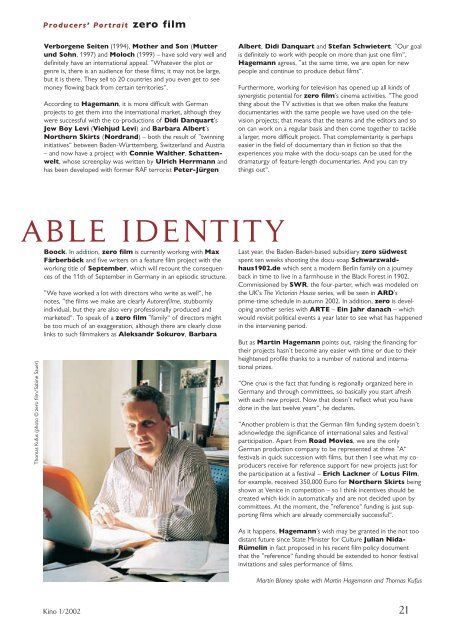Titel Kino 1/2002 - German Cinema
Titel Kino 1/2002 - German Cinema
Titel Kino 1/2002 - German Cinema
Create successful ePaper yourself
Turn your PDF publications into a flip-book with our unique Google optimized e-Paper software.
Producers’ Portrait zero film<br />
Verborgene Seiten (1994), Mother and Son (Mutter<br />
und Sohn, 1997) and Moloch (1999) – have sold very well and<br />
definitely have an international appeal. ”Whatever the plot or<br />
genre is, there is an audience for these films; it may not be large,<br />
but it is there. They sell to 20 countries and you even get to see<br />
money flowing back from certain territories“.<br />
According to Hagemann, it is more difficult with <strong>German</strong><br />
projects to get them into the international market, although they<br />
were successful with the co-productions of Didi Danquart’s<br />
Jew Boy Levi (Viehjud Levi) and Barbara Albert’s<br />
Northern Skirts (Nordrand) – both the result of ”twinning<br />
initiatives“ between Baden-Württemberg, Switzerland and Austria<br />
– and now have a project with Connie Walther, Schattenwelt,<br />
whose screenplay was written by Ulrich Herrmann and<br />
has been developed with former RAF terrorist Peter-Jürgen<br />
ABLE IDENTITY<br />
Thomas Kufus (photo © zero film/Sabine Sauer)<br />
Boock. In addition, zero film is currently working with Max<br />
Färberböck and five writers on a feature film project with the<br />
working title of September, which will recount the consequences<br />
of the 11th of September in <strong>German</strong>y in an episodic structure.<br />
”We have worked a lot with directors who write as well“, he<br />
notes, ”the films we make are clearly Autorenfilme, stubbornly<br />
individual, but they are also very professionally produced and<br />
marketed“. To speak of a zero film ”family“ of directors might<br />
be too much of an exaggeration, although there are clearly close<br />
links to such filmmakers as Aleksandr Sokurov, Barbara<br />
<strong>Kino</strong> 1/<strong>2002</strong><br />
Albert, Didi Danquart and Stefan Schwietert. ”Our goal<br />
is definitely to work with people on more than just one film“,<br />
Hagemann agrees, ”at the same time, we are open for new<br />
people and continue to produce debut films“.<br />
Furthermore, working for television has opened up all kinds of<br />
synergistic potential for zero film’s cinema activities. ”The good<br />
thing about the TV activities is that we often make the feature<br />
documentaries with the same people we have used on the television<br />
projects; that means that the teams and the editors and so<br />
on can work on a regular basis and then come together to tackle<br />
a larger, more difficult project. That complementarity is perhaps<br />
easier in the field of documentary than in fiction so that the<br />
experiences you make with the docu-soaps can be used for the<br />
dramaturgy of feature-length documentaries. And you can try<br />
things out“.<br />
Last year, the Baden-Baden-based subsidiary zero südwest<br />
spent ten weeks shooting the docu-soap Schwarzwaldhaus1902.de<br />
which sent a modern Berlin family on a journey<br />
back in time to live in a farmhouse in the Black Forest in 1902.<br />
Commissioned by SWR, the four-parter, which was modeled on<br />
the UK’s The Victorian House series, will be seen in ARD’s<br />
prime-time schedule in autumn <strong>2002</strong>. In addition, zero is developing<br />
another series with ARTE – Ein Jahr danach – which<br />
would revisit political events a year later to see what has happened<br />
in the intervening period.<br />
But as Martin Hagemann points out, raising the financing for<br />
their projects hasn’t become any easier with time or due to their<br />
heightened profile thanks to a number of national and international<br />
prizes.<br />
”One crux is the fact that funding is regionally organized here in<br />
<strong>German</strong>y and through committees, so basically you start afresh<br />
with each new project. Now that doesn’t reflect what you have<br />
done in the last twelve years“, he declares.<br />
”Another problem is that the <strong>German</strong> film funding system doesn’t<br />
acknowledge the significance of international sales and festival<br />
participation. Apart from Road Movies, we are the only<br />
<strong>German</strong> production company to be represented at three ”A“<br />
festivals in quick succession with films, but then I see what my coproducers<br />
receive for reference support for new projects just for<br />
the participation at a festival – Erich Lackner of Lotus Film,<br />
for example, received 350,000 Euro for Northern Skirts being<br />
shown at Venice in competition – so I think incentives should be<br />
created which kick in automatically and are not decided upon by<br />
committees. At the moment, the ”reference“ funding is just supporting<br />
films which are already commercially successful“.<br />
As it happens, Hagemann’s wish may be granted in the not too<br />
distant future since State Minister for Culture Julian Nida-<br />
Rümelin in fact proposed in his recent film policy document<br />
that the ”reference“ funding should be extended to honor festival<br />
invitations and sales performance of films.<br />
Martin Blaney spoke with Martin Hagemann and Thomas Kufus<br />
21
















